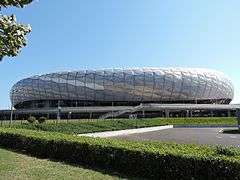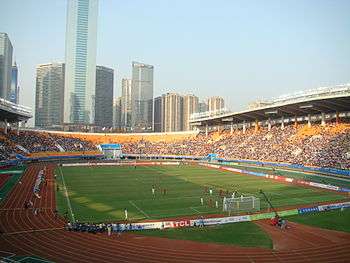Football in China
Football in China consists of association football (Chinese: 足球; pinyin: zúqiú) as well as the China national football team. Modern football has been one of the most well supported sports in China, since it was introduced in the early 20th century. The country was recognised by former FIFA president Joseph "Sepp" Blatter as the first to invent football, 5000 years ago through Cuju, an ancient Chinese ball game (although there are rule differences between Cuju or Tsu' Chu and modern association football). English sources claim that football was officially formalised in England in 1863, originating from a simple game that had been played for many centuries between villages in England, while maintaining that the word "invention" was really a global collaboration between many civilizations besides these two. [1][2][3].
| Football in China | |
|---|---|
 Home stadium of club Dalian Yifang F.C. | |
| Country | Republic of China |
| Governing body | Chinese Football Association |
| National team(s) | China national football team |
National competitions | |
Club competitions | |
International competitions | |

The national governing body is the Chinese Football Association (CFA). Hong Kong and Macau have separate national teams and leagues. Association football is the most popular spectator sport in China, followed by basketball.
According to FIFA ranking on 10 August 2017, the Men's National Team is ranked 77th in the world, and according to FIFA women's world rankings on 23 June 2017, the Women's National Team is ranked 14th.
Professional league
The Chinese Football Association Super League (中国足球协会超级联赛), commonly known as Chinese Super League (中超联赛, CSL), currently known as the Wanda Plaza Chinese Super League, is the highest tier of professional association football in China, operating under the auspices of the Chinese Football Association (CFA).[4]
The Super League was created by the re-branding of the former top division, Chinese Football Association Jia-A League, in 2004. While the league originally consisted of 12 teams, 16 teams now compete in it. The title has been won by seven teams:Shanghai Shenhua, Shenzhen Jianlibao, Dalian Shide, Shandong Luneng, Changchun Yatai and Beijing Guoan. The current Super League champions are Guangzhou Evergrande and in 2015 the average attendance has been of 22,193 spectators.
National team
The China PR national football team is governed by the Chinese Football Association (CFA).[5] The team was founded in 1924 in the Republic of China under the auspices of the China Football Association and joined FIFA in 1931. Following the Chinese Civil War, the CFA was formed in the newly founded People's Republic of China. They remained affiliated with FIFA until 1958, when they withdrew, but they rejoined in 1979.
China have been runners-up at the Asian Cup twice: in 1984 and 2004.[6]
Football development
Football initiatives have been developed, including Vision China - a part FIFA Vision Asia - which has reached the highest standard in Asia and the quarter final of the men's competition in the 2008 Olympics. The programmed covers marketing, development, footballer training, coach and referee training, sports medicine, competitions, media, and fans. It also includes assessments on Chinese football, planning matches and monitoring them. Goal Project for China, part of FIFA Goal Project invested in China to help build the new headquarters of the CFA.[7]
An early form of football was developed in China in the Han dynasty, during the second and third centuries BCE, called Cuju or Tsu' Chu. This is in fact the earliest form of football worldwide for which there is documentary evidence, in the form of a military manual. This was played using a leather ball filled with feathers and hair and a small net held by long bamboo canes. This game died out well before modern football was adopted in China.[8]
The Chinese government has outlined plans to make the Asian nation a footballing superpower and to create 50,000 special football schools in a decade.[9]
Media coverage of football in China
Football is covered by the Chinese media.[10] National competitions are generally televised on CCTV-5 and CCTV-5+. Guangdong Television reserves rights, however, for the Premier League and the UEFA Champions League. Since 1996, CCTV-5 has weekly programmes televising live games in the Italian Serie A and German Bundesliga to Football Night (足球之夜). Serie A, Bundesliga and La Liga are broadcast on CCTV-5. Shanghai's Dongfang Sports channel also has regular football coverage.
Foreign leagues
Chinese football fans often associate themselves most with teams in the English Premier League, the Italian Serie A, the Spanish La Liga and the German Bundesliga.[11] Chinese players going to play in European leagues attracts massive media attention. The pioneers were Xie Yuxin who joined FC Zwolle (Netherlands), Gu Guangming who joined SV Darmstadt 98 (Germany), and Jia Xiuquan and Liu Haiguang both joined FK Partizan (Yugoslavia), all in 1987.[12] Prominent more recent examples include Sun Jihai, formerly of Manchester City; Zheng Zhi, who played for Celtic; Shao Jiayi, formerly of 1860 Munich, now of MSV Duisburg; Yang Chen, formerly of Eintracht Frankfurt; and Wu Lei, of RCD Espanyol.[13][14] [15][16]
Corruption and criticism in Chinese football
Despite the increasing economic power and large sum of money being spent to develop football, Chinese football state is heavily criticized.
The professional league is marred by match-fixing, illegal betting, and violence on and off the pitch,[17][18] which the Chinese government has promised to fix.[19] Two former top executives of the Football Association of China were arrested and prosecuted for taking bribes.[20]
The Super League of China is also heavily criticized for overusing of foreign players in Chinese football clubs, including many record-breaking transfers of foreign superstars which harmed the development of local players.[21][22] On the other hand, due to China's lack of acknowledging of racism inside the country, the racist sentiment against foreign players, especially African players, are also widely seen in China, majority goes unnoticed until Demba Ba's case.[23][24]
The deterioration of the senior's team performance also affects public opinions, which have several times caused uproar and riots. In 2013, when China suffered a humiliating 1–5 home loss to Thailand, Chinese supporters went furious and hostile to the national side, which caused then-manager José Antonio Camacho to be sacked.[25] The uproar was later found during the 2018 FIFA World Cup qualification – AFC Third Round, when China was humiliated, this time, by war-torn Syria 0–1 right at home soil, Chinese fans held a protest demanding the President of CFA, Cai Zhenhua, to resign.[26]
In 2020, former Chinese star Hao Haidong published his criticism over the football state of China, accusing the Chinese communist government of mismanaging football and even connected its mismanagement to how China mishandled the COVID-19 outbreak which led to global lockdown.[27]
References
- "History of Football - Britain, the home of Football". FIFA.com.
- Post Publishing PCL. "Bangkok Post article". bangkokpost.com.
- "History of Football - The Origins". FIFA. Retrieved 29 April 2013.
- Sheringham, Sam (8 January 2013). "BBC Sport - Didier Drogba & Nicolas Anelka put Chinese football on the map". Bbc.co.uk. Retrieved 28 October 2013.
- "Why China fails at football: Little red card". The Economist. 17 December 2011. Retrieved 20 September 2012.
- Minter, Adam. "Why Chinese Hate Their Men's Soccer Team". Bloomberg. Retrieved 2 December 2013.
- "AFC to support Chinese football". English.people.com.cn. Retrieved 20 September 2012.
- "History of Football - The Origins". FIFA. Retrieved 12 June 2015.
- https://www.rt.com/sport/324741-china-football-world-cup/
- "Let professionals run Chinese soccer | South China Morning Post". Scmp.com. Retrieved 20 September 2012.
- "Pay, Not Play, Fuels British Invasion Of Chinese Soccer". NPR. 27 July 2012. Retrieved 20 September 2012.
- Saga over As Dong Joins Man Utd at china.org.cn, 18-1-2007, Retrieved 5-4-2012
- "Chinese soccer: Vanity project or emerging superpower? - CNN.com". Edition.cnn.com. Retrieved 20 September 2012.
- "Why China fails at football: Little red card". The Economist. 17 December 2011. Retrieved 20 September 2012.
- "A changing game for soccer in China". Chinadaily.com.cn. 6 July 2011. Retrieved 20 September 2012.
- Duerden, John (3 May 2012). "Sports: Soccer". The New York Times. Retrieved 20 September 2012.
- Osnos, Evan. "Corruption in Chinese Soccer". The New Yorker. Retrieved 20 September 2012.
- Reuters in Beijing (13 June 2012). "China soccer match-fixing: former football chief and top players jailed | World news | guardian.co.uk". London: Guardian. Retrieved 20 September 2012.
- Barboza, David (13 June 2012). "Lengthy Prison Terms in Chinese Soccer Corruption Case". The New York Times. Retrieved 20 September 2012.
- Barboza, David. "Soccer Officials Sentenced in China", The New York Times. Retrieved 2013-10-9
- https://www.theguardian.com/football/these-football-times/2017/jan/05/china-chinese-super-league-oscar-carlos-tevez
- https://www.scmp.com/sport/soccer/article/2062455/have-shock-new-rules-foreign-players-burst-chinese-footballs-transfer
- https://supchina.com/2018/08/06/demba-ba-enraged-alleged-racism-chinese-super-league/
- https://foreignpolicy.com/2020/04/15/chinas-racism-is-wrecking-its-success-in-africa/
- https://www.scmp.com/sport/china/article/1262784/china-players-accused-corruption-after-heavy-defeat-against-thailand
- https://qz.com/803380/chinas-soccer-fans-are-protesting-in-the-streets-after-their-national-team-lost-to-syria/
- https://today.rtl.lu/sport/international/a/1529623.html
External links
- Chinese Football Association official website (in Chinese)
- Team China Official Website (in English)
- Profile on FIFA official website (in English)
- Profile on AFC official website (in English)
- Corruption in Chinese football about whole events (in Chinese)
- Wildeastfootball.net